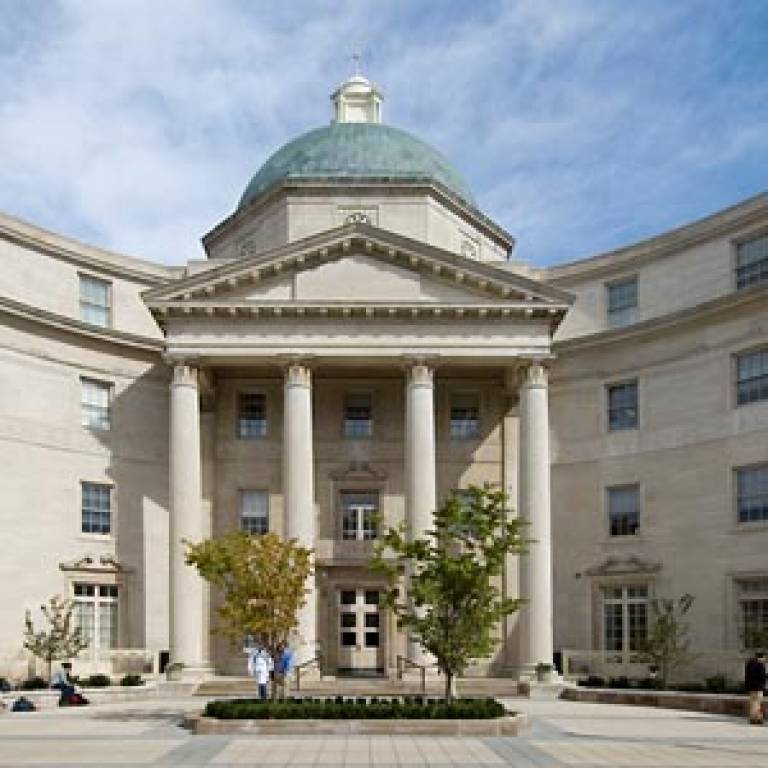UCL and Yale unite to improve global health
8 October 2009
Links:
 uclpartners.com/" target="_self">UCL Partners
uclpartners.com/" target="_self">UCL Partners
UCL and Yale University have formed an alliance to improve global health through scientific research, clinical and educational collaboration.
The agreement brings together the skills and expertise of UCL and its associated hospitals (known as UCL Partners), Yale University and Yale-New Haven Hospital. It is based on the universities' shared aims to advance biomedical research and treatment of disease for people around the world.
Watch the Provost's comment at the signing
Both UCL and Yale University are centres of
biomedical research and rank in the top echelon of educational
institutions in the world. They hold fourth and third place
respectively in the Times Higher Education-QS World University Rankings
2009, published today.
The new collaboration will immediately create new joint clinical programmes to treat cardiomyopathy, congenital heart disease, sudden cardiac death and chronic total occlusion of the coronary arteries. In addition to exchanging expert physicians to treat individual cases at each site, the members of the collaboration will make use of telemedicine technology to share clinical information and expertise among themselves, and eventually with other institutions around the world.
The Yale-UCL collaboration is the brainchild of Professor John Martin from UCL and Yale's Michael Simons, two distinguished heart researchers and physicians. The agreement was signed in the presence of Tony Blair, former Prime Minister of the United Kingdom who is currently teaching at Yale.
"UCL Partners welcomes the many opportunities this collaboration
creates," said Professor David Fish, Managing Director of UCL Partners.
"We can learn from each others' different experiences, optimise
complementary resources, and help find ways that better address the
healthcare challenges of the populations we serve."The system of comprehensive clinical care delivered by UCL's NHS-affiliated hospitals will enable joint longitudinal studies and clinical trials of new medicines which could greatly benefit patients.
By analysing healthcare delivery in the diverse settings overseen by each institution, researchers can work to develop best management practices for hospitals. UCL scientists will also benefit from new links to Yale's renowned scientists and physicians, and will be able to make use of Yale's world-class research infrastructure.
"This is a remarkable partnership between two of the world's top universities," said UCL President and Provost Professor Malcolm Grant. "We will be combining forces to tackle some of the world's major problems, working closely with our partner hospitals. Our initial focus will be on cardiovascular disease, cancer and neurosciences. This will be a very active partnership and we look forward to the advances, in biomedicine and beyond, which will be the consequence of this unique alliance."
Collaborative projects
UCL and Yale will together search for genes that cause congenital heart disease, funded by a £2.8 million grant from the National Institutes of Health.
The team will use cutting-edge genomic screening at Yale to investigate a large cohort of heart disease patients being followed at UCL, University of Rochester and Yale in order to identify disease genes.
Many other basic research projects are already underway on the genetic basis of hypertension and heart disease, as well as initiatives in drug discovery and imaging - areas in which UCL and Yale both have top researchers and well-developed infrastructure.
The collaboration will expand into other areas of basic research, including cancer biology, neuroscience and women's health. Partners in industry will be sought to advance projects that have commercial applications.
Ideas for future collaborations include a transatlantic fiber-optic network joining high-performance computing resources at UCL and Yale to share data efficiently, and a coordinated PhD training programme that will allow doctoral students to take advantage of the clinical and research resources of both UCL and Yale.
Image: Yale School of Medicine
Video: UCL President and Provost Professor Malcolm Grant (second from left) signs the agreement as Tony Blair looks on (far right)
UCL context
UCL Partners comprises five of London's biggest and best known hospitals and research centres: UCL, Great Ormond Street Hospital for Children NHS Trust (GOSH), Moorfields Eye Hospital NHS Foundation Trust, the Royal Free Hampstead NHS Trust and UCL Hospitals NHS Foundation Trust (UCLH).
It was designated as one of the UK's first academic health science centres by the Department of Health in March 2009 after a rigorous selection process, and will bring together the combined skill and expertise of its clinicians and researchers to focus on child health, eyes and vision, immunology and transplantation, neurological disorders, women's health, cardiovascular, and cancer.
Related news
UCL podcast: UCL Provost discusses the Yale alliance and rise in world rankings
New leadership team for the UCL School of Life & Medical Sciences
UCL Partners: managing director and programme directors appointed
 Close
Close

